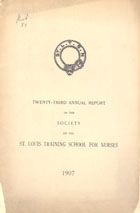Health Professions
St. Louis Training School for Nurses – Rules for Admission, 1907
The St. Louis Training School for Nurses opened in the spring of 1884 and was the first such school in Missouri. The course of instruction was initially two years, but expanded to three in 1905. According to a history of the School written in 1941, in the early years “students were admitted to the school whenever desirable applicants presented themselves.” However, few met the “high standard of character and general fitness for nursing” that was required. Over 20 years later, the School still set high standards for admission. The following “Rules for the Admission of Pupils” was included in the “Twenty-Third Annual Report of the Society of the St. Louis Training School for Nurses,” published in 1907.
RULES FOR THE ADMISSION OF PUPILS
TO THE
ST. LOUIS TRAINING SCHOOL FOR NURSES
The Executive Committee of the St. Louis Training School for Nurses offers, at the St. Louis City Hospital, a three years’ course of training to women desirous of becoming professional nurses.
Applicants for admission to the Training School should be preferably between twenty-three and thirty-three years of age, and of medium height and size; they must also have had a good common school education. They must present certificates of good character, sound health, and physical capacity for the duties of nurses, satisfactory to the Admission Committee and to the Superintendent of the Training School.
After approval they will be received into the School for two months on probation, during which time they will have board and lodging and washing, but will receive no other compensation. They must then sign an agreement to remain in the School and subject themselves to its rules and to those of the Hospital, for a period of three years from date of their reception into the School. Applicants may be received at any time during the year, as vacancies may occur.
Failure to discharge the duties imposed, violation of the rules or regulations of the School or Hospital, or evidence of moral or physical unfitness for the work will be deemed sufficient cause for dismissal.
A monthly allowance of eight dollars ($8) for the first year, ten ($10) for the second year, and twelve ($12) for the third year, will be made to each pupil. This sum is allowed for clothing, text-books, and other personal expenses of the nurses, but is in nowise intended as wages; it being considered that the education given is a full equivalent for their services. Board and washing will be furnished without charge, and in illness all pupils will have gratuitous medical attention; but time lost must be made up.
During the two months of trial, and previous to being accepted as a pupil in the School, the applicant must be prepared for an examination in reading, penmanship, simple arithmetic and English dictation. The examination is to test the applicant’s ability to read aloud well, to write legibly and accurately, to understand mathematics as far as fractions and per cent, and to take notes accurately. This amount of education is indispensable; applicants are reminded that women of superior education and cultivation will be preferred.
Applicants must bring with them:
1 large shoe-bag.
4 Bishop collars.
1 pin-ball, small.
1 pair scissors.
1 soiled-clothes bag.
1 trunk of medium size.
3 perfectly plain dresses, of wash material, buttoned in front.
6 plain white cotton aprons, made to come within two inches of the bottom of the skirt, to meet behind, gathered to a band.
2 colored gingham aprons.
Rain-coat and rubbers.
Shoes, broad and with low heels; slippers and low-cut shoes are not allowed in the Hospital.
All clothing must be plainly marked.
Applicants must be vaccinated and teeth must be attended to before coming for probationary month.
The nurses are required, after two months’ probation, to wear, when on duty, the dress prescribed by the School, simply made, with white apron and cap, and linen collar and cuffs.
The day nurses are on duty from 6 a.m. to 6 p.m., and, when practicable, are allowed some time each day for exercise in the open air. They are also given one half-day each week, and one half-day on Sunday. A vacation of two weeks is allowed each year.
It is not intended to place nurses on night duty until they have been in the School three months.
At the end of each term there will be an examination of the pupils, conducted under the supervision and in the presence of a Committee of the Corps of Lecturers and the Superintendent of the Hospital, which, being creditably passed, shall entitle pupils of three years’ standing to the Diploma of the Training School; but the Board may refuse to grant such Diploma to any pupil, for good cause.
Probationers, on coming to the School, must bring with them enough money to enable them to return home if necessary.
Related Links:
Return to Nursing (Health Professions)
Return to Health Professions
Back to Top

